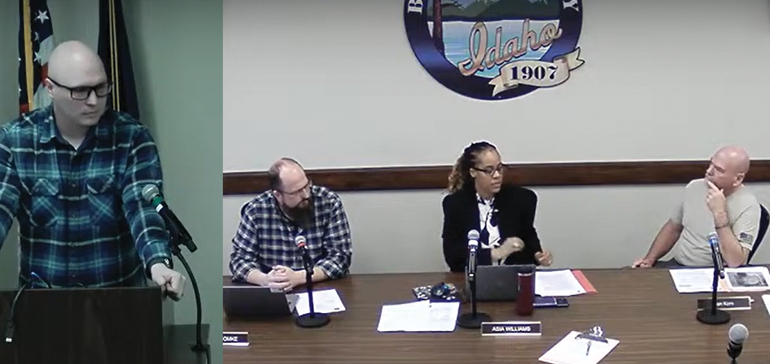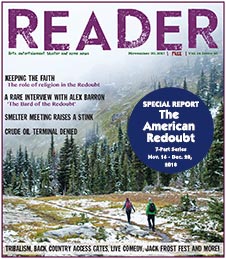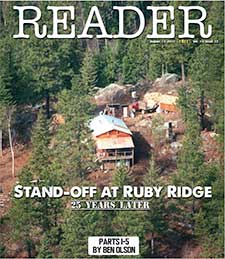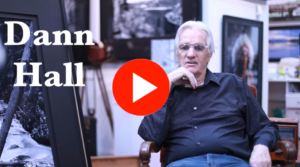BOCC cures Open Meeting Law violation, strikes then reinstitutes moratorium on MLDs
By Soncirey Mitchell
Reader Staff
Nearly a month after the Bonner County board of commissioners approved an 182-day moratorium on all minor land divisions and family exemptions, the board held a special meeting April 21 to discuss whether its actions violated Idaho Open Meeting Law and, if so, what that would mean for the temporary moratorium.
Over the course of the three-and-a-half-hour meeting, the board voted to admit to and cure the inadvertent violation, then reinstate a modified version of the original moratorium. The revised version will go into effect Monday, May 19 and remain active until Wednesday, Oct. 1 and will not include family exemptions.

Planning Director Jake Gabell (left) presents the MLD and family exemption moratorium to Bonner County Commissioners Brian Domke, Asia Williams and Ron Korn (right) in March. Photo courtesy of YouTube.
Planning Director Jake Gabell and Deputy Prosecutor Bill Wilson proposed the temporary moratorium on March 25 to give the Planning Department time to fix loopholes in County Code governing MLDs, which have allowed developers to create de facto subdivisions without the infrastructure to support them. Gabell identified issues such as the lack of fire mitigation and stormwater management requirements, and “no guarantee” of regulations on road width, surfacing and accessibility measures for first responders, among others.
Though the current MLD language has been in place for four years, Gabell and Wilson argued that it presented a great enough risk to “public health, safety and welfare” to constitute an emergency and could, therefore, be added to the agenda the day of the meeting without going through the usual noticing process. That move was meant to allow the BOCC to pass the moratorium before developers could flood the department with applications under the current law, Wilson said at the time.
Commissioner Ron Korn — who was the dissenting vote on the original moratorium — placed the subject of the Open Meeting Law violation on the April 21 agenda, arguing that the decision was a “gross misconduct of government.” He and other critics, such as Bonner County Republican Central Committee Chair Scott Herndon, argued that the BOCC did not have the authority to withhold an agenda item until the day of the meeting or to amend agendas during the course of a regular meeting.
In his counter-argument, Wilson cited Idaho Code 67-6523, which gives the board power to institute emergency moratoriums if it “finds that an imminent peril to the public health, safety or welfare” requires it. He also justified the last-minute amendment using I.C. 74-204, which gives the board authority to amend an agenda “after the start of a meeting upon a motion that states the reason for the amendment and states the good faith reason the agenda item was not included in the original agenda posting.”
Herndon also cited I.C. 74-204 in his arguments, which he broadcast in a mass email and Facebook message that urged members of the public to attend the April 21 meeting “to stand up for transparent government and your property rights.”
He maintained that because Commissioner Brian Domke did not state the reason for the emergency declaration in the language of his March 25 motion, he had not met the requirements to amend the agenda under I.C. 74-204.
Wilson said this critique “hits closer to the mark” than the others.
“We ended up having probably a 15- or 20-minute debate on the merits of amending the agenda, and the basis for the emergency was explained and debated,” said Wilson, “but when the motion was made, it did not specifically identify an emergency or state the basis for that, so the question then is: ‘Does that constitute an open meeting violation?’ And my answer is, ‘I’m not sure.’”
Both Wilson and Domke agreed that the March 25 meeting followed the spirit but not the letter of the law, and recommended the board cure the violation to prevent any potential legal issues. Though everyone involved — except Korn — maintained that the apparent violation was an honest mistake, angry residents still flooded the public meeting due to Herndon’s published comments.
“Two bureaucrats in Bonner County recently led Bonner County commissioners into violations of Idaho’s Open Meeting laws,” wrote Herndon, referring to Wilson and Gabell.
Herndon’s message alleged that Gabell had purposefully violated the law and kept the moratorium a secret to keep citizens from “exercis[ing] their lawful property rights.”
Many present at the April 21 meeting leveled disparaging or critical remarks at Domke, BOCC Chair Asia Williams, Gabell and Wilson, echoing comments made online and outside the meeting, which Williams described as an “outpour of hatred.” Others accused Herndon of “trying to work the public into a frenzy.”
“Some allegations have assigned the motive as the board’s desire to act as rulers who treat the public as peasants,” said Domke, reading from a prepared statement. “Such assertions are both inaccurate and inappropriate. …
“Spreading slander throughout the community instead of directly addressing the person — or in this case, the board — with whom you have a grievance is not the appropriate method for addressing concerns and disagreements,” he later added. “Such actions do not align with general moral principles or Christian values. I mention the Christian values because many of the people spreading such slander openly state they’re prescribed to such Christian values.”
Korn did not comment on the hostility in the room but stated repeatedly that the board “did violate the open meeting laws” and advised that they cure the violation to prevent “further litigation and/or fines.”
When asked what “litigation” the moratorium had already incurred, Williams and Domke said that the only “threat” the BOCC had received was from Herndon. Herndon’s email campaign called on the board to “correct their course before incoming litigation later this week from Bonner County residents that were adversely impacted by the illegal moratorium.”
Williams agreed to recognize the error but maintained that the board’s actions were sanctioned and informed by legal counsel and were intended to protect public health and safety.
“I don’t think that you did something wrong,” said Williams, addressing Domke. “I don’t think I did something wrong. I don’t think that’s what took place. … [A]s with every motion made, we can make a better motion every single time.”
In reference to Herndon’s allegations, Williams said that “the central committee isn’t the attorney for the board.”
Domke made a motion to cure the violation, which passed unanimously and voided the original moratorium. While Korn opposed reinstating the moratorium, Williams and Domke believed that it was still necessary to protect public health.
“The outcome of this cure, I believe, exacerbates the potential risk, and I, for one, am not willing to just sit idly by and wait for a catastrophe to occur before somebody acknowledges the fact that real risk has been created,” said Domke.
“That said, I think the right process at this time would be to quickly begin to go through a workshop process to gain input, to work with the Planning Department, to work with the Planning Commission and amongst the board in the right process to reach decisions regarding how best to amend the current county code,” he continued.
Domke admitted he wasn’t yet ready to reinstate the moratorium, but Williams argued that a new, revised version could address the public’s concerns while still protecting the county.
“For people that are looking at the growth of Bonner County, how we grow matters. If we grow without addressing the concerns, we are then grandfathering in the problem,” said Williams.
Acknowledging that most complaints about the moratorium came from people looking to apply for a family split for their children or grandchildren, Williams suggested that they not include family exemptions in the new moratorium.
Both methods of land division have the same issue, but family exemptions only give landowners the right to sell or gift a portion of unplatted land to close relatives or spouses, making it more difficult for commercial developers to take advantage.
The vote to adopt a new moratorium passed with Korn dissenting. The revised moratorium will give the Planning Department time to close the larger loophole while still allowing families to break up their land in the meantime.











 Coming up this week! Don’t miss Live Music, the Summer Sampler, the Art Party, Monarch Grind, the Sandpoint Renaissance Faire, and more! See the full list of events in the
Coming up this week! Don’t miss Live Music, the Summer Sampler, the Art Party, Monarch Grind, the Sandpoint Renaissance Faire, and more! See the full list of events in the 